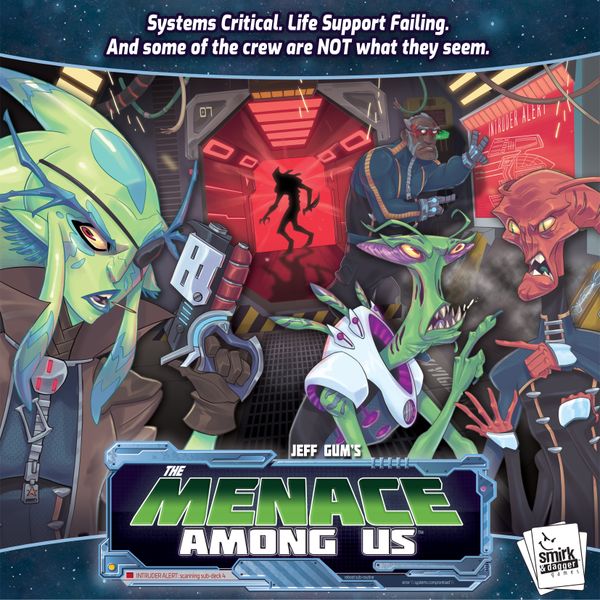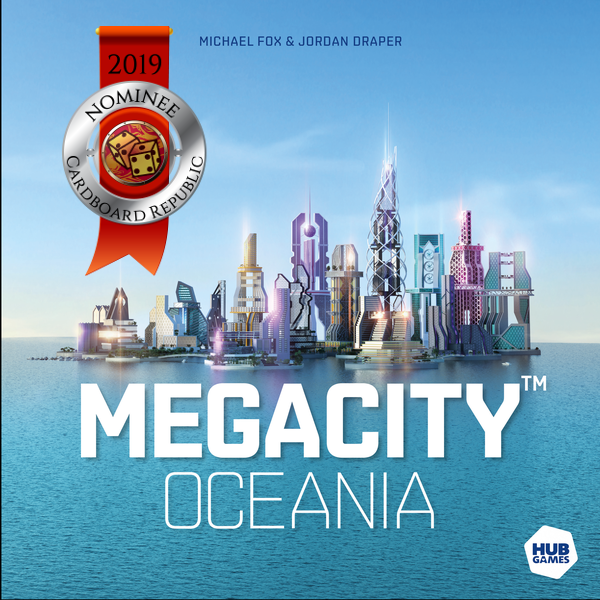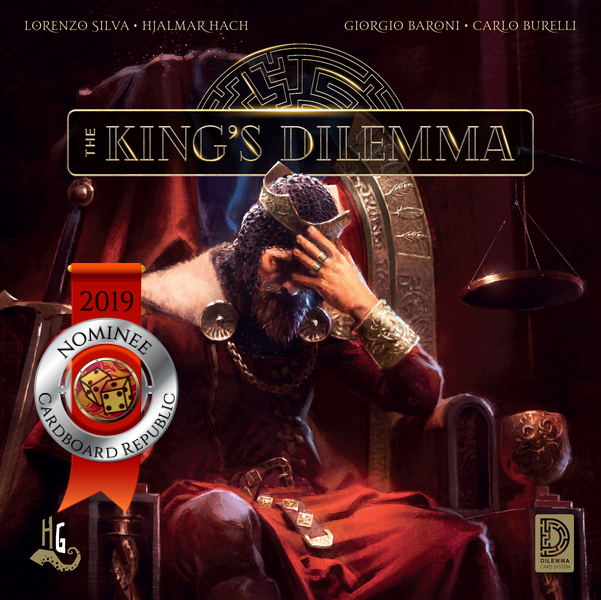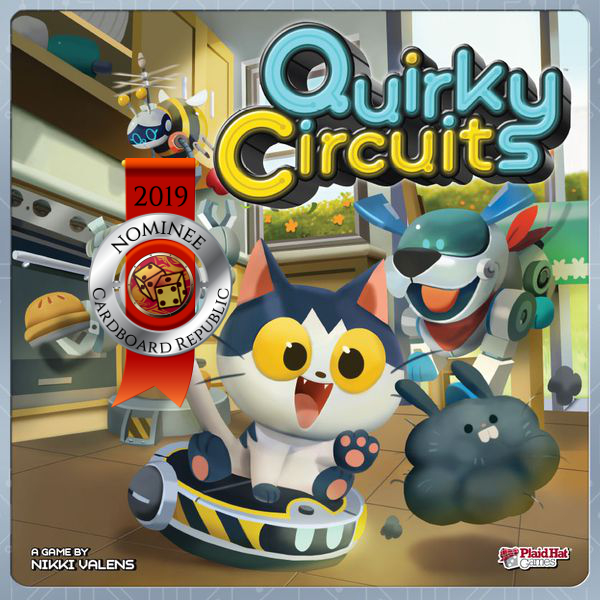The Cardboard Republic has rolled out the annual Laurels of the Republic awards, celebrating the best new games released in 2019 for each of the gamer archetypes. What follows are the finalists for one of those groups.
 Always the penultimate gamblers, Daredevils like living on the edge. This group adheres to the idea of high risk and high reward, never letting a silly thing like failure get in their way of possible victory – or a good time. That said, this group doesn’t avoid or dislike strategy either. Rather, they’re just far more willing to take chances for a better payoff, be it on the battlefield or the board room. Essentially, Daredevils like to win, but they want to do it on their terms. They adore games giving them a wide variety of options to cross the finish line, and if they have to embrace a bit of luck to accomplish that, then so be it!
Always the penultimate gamblers, Daredevils like living on the edge. This group adheres to the idea of high risk and high reward, never letting a silly thing like failure get in their way of possible victory – or a good time. That said, this group doesn’t avoid or dislike strategy either. Rather, they’re just far more willing to take chances for a better payoff, be it on the battlefield or the board room. Essentially, Daredevils like to win, but they want to do it on their terms. They adore games giving them a wide variety of options to cross the finish line, and if they have to embrace a bit of luck to accomplish that, then so be it!
And with that, here are The 2019 Laurel Finalists for Daredevils:
Honorable Mention: The Menace Among Us
Publisher: Smirk & Dagger Games | Players: 4-8 | Play Time: 40-60 Minutes
Games of duplicity and manipulation are not for everyone. Maneuvering through such settings requires not only a hint of moral flexibility but also the personal fortitude to execute such deception against people that, presumably, you actually like. For some, stepping into such impish shoes is a respite to act outside the norm for a short time. To others such separation is impossible; to them, games of backstabbing and betrayal potentially offer more malice than mirth.
When The Menace Among Us came along during the summer of 2019, it claimed to offer an electric hour-long experience within that familiar framework but without the same levels of stress and anxiety. A claim, it turns out, that wasn’t full of hot air.
Or any air for that matter.
But that’s also kind of the problem.
In this semi-cooperative hidden traitor game, players are adrift in a crippled spaceship that’s leaking oxygen. Over the span of several rounds, players must work together to repair the ship and seal the hole – or die trying. Compounding this cosmic conundrum, however, is a trio of additional problems. First, every action requires some of that precious oxygen. Second, each player has their own secret victory agenda, and not all of them jive with one another. And finally, as you’d expect, not everyone on the ship is who they say they are – which means that some are actively working against the group.
M.A.U. has been affectionately referred to as ‘BSG Lite’, referencing the highly successful 2008 hit Battlestar Galactica. The description is fairly apt, albeit with a dash of Dead of Winter thrown in. In this glib setting, discerning who you can trust is both necessary and challenging. With a concise, nuanced approach that allows you to obfuscate your actions and pursue your agenda via randomized card submissions rather than the need for acting classes (or innate sociopathy), Menace is a breath of fresh air to the genre. Thanks to a numerous possible loyalties, this shipwreck of a setting is a Daredevil’s playground, allowing them to explore different means to manipulate the state of the ship and its crew in their favor with gleeful impunity – regardless of the outcome.
The Nominees

Number Five: Flotilla
Publisher: WizKids | Players: 3-5 | Play Time: 90-150 Minutes
Nearly all games follow a linear flow as it meanders its way from start to finish. From party games to wargames, the mechanics you follow at the beginning almost always match those at the end; gaming isn’t known for its musical bridges. Yet on occasion you come across a title that advertises a sizable rules shift somewhere during the game. Even rarer are those that give you the choice in the matter.
Flotilla is one such number.
Set in an alternate-reality Earth where our reckless atomic bomb testing of the 40s and 50s actually did result in kinda, sorta, blowing up a good chunk of the world, Flotilla tasks players with building up the last mainstay of human civilization in the form of a giant ramshackle city on the ocean.
Players start off as divers, captains, and other ocean-goers who are rewarded for (literally) shoring up new territory, gathering resources, finding relics, and making inroads with the various influential factions in town. All for the accumulation of VP. Recovering all these remnants is not without risk, however, as nearly every facet of exploration brings with the chance of exposure to toxic nuclear radiation.
So, yeah, it’s basically Waterworld meets Fallout. Only with fewer mutants.
The hook to Flotilla is that at any point a player can opt to turn in their flippers for flats and continue as a member of the city itself. Although VP is still the principal goal, and you’re still currying favor with the factions, your tasks towards that as a newly-minted landlubber shift to researching technologies, managing the city’s population, and making money.
It is precisely that decision why Flotilla proves itself such an interesting vista for Daredevils and what separates itself from similar games. Not only is it up to you when – or even if – you want to make that profession change, but there are marked risks to consider no matter which path you choose. Tying into their love of this group’s love of experimentation and freedom of choice, Flotilla offers a curious floating world to discover, strategic yet agency-driven, and it’s up to you (with a dash of added luck) over how your story will unfold.
Number Four: MegaCity: Oceania
Publisher: Hub Games | Players: 2-4 | Play Time: 45-60 Minutes
Board gaming has no shortage of commonly used themes. One of the most common is the aspect of city building, where it’s your job to perform a feat of urban development – be it in the form of an entire city or a single structure. It’s a much beloved theme, with one small but obvious caveat that its most ardent fans inevitably ask: why must it be that such an otherwise tactile process always feel so abstracted?
That was the problem that MegaCity: Oceana decided to tackle from the ground up. Because with it comes a dexterity-laden city building game where you actually physically build the city in question.
So come as we are whisked into the future for, remarkably, another floating city project…albeit one with a slightly less dystopian outlook.
Slightly.
In this world, overpopulation has led to the desire for a massive planned cityscape on the seas, and players are architects competing over building contracts as they collectively erect structures. Throughout the game players will vie for building contracts and various project feats. How you decide to build your structure is determined partially by the base needs of the contract itself, partially by collecting building pieces of various sizes, shapes, and material types via a bag-pulling system, and, leaning into the game’s central conceit, largely by your own imagination.
MegaCity easily delivers on this premise. Time between turns to create your tower allows you to follow your architectural fancy, and so long as you meet the demands of the contract, you have extensive control over how each of your structures turn out. For Daredevils, who adore games that reward you for trying something just to see what happens, the game offers one of the best free-form building exercises short of just handing them a pile of Legos. With simple rules, a phenomenal table presence, and endless possibility for variance, MegaCity provides ample room for levity and creative expression while still being grounded with concrete purpose to your actions. Thanks to this process, no two finished cities will ever look the same. And we are all the better off because of it.
Steady hand not included.
Number Three: The King’s Dilemma
Publisher: Horrible Guild / Luma Games | Players: 3-5 | Play Time: 45-60 Minutes
As the saying goes, it’s good to be king. And why not? Extravagant living …while hoping it won’t spur a revolt. Hosting lavish parties…while navigating endless courtly intrigue. And protecting your loyal subjects…so long as a battlefield injury, sudden illness, or assassin’s blade doesn’t put a stop to that first.
Yes, it is good to be king. At least relative to the rest of the citizenry. Which is to say, difficult, challenging, and often unforgiving.
In reality, running a medieval kingdom involved more than royal fiat. If Game of Thrones taught people anything – other than dragons are probably more trouble than they’re worth – it’s that even a world of sword and sorcery can be pretty complicated.
It is that muddled, messy moray you find yourself in with The King’s Dilemma: a flavorful narrative-driven legacy game about being forced to make hard choices and then living with the consequences.
In TKD, each player represents one of the kingdom’s great houses on the King’s Council and who deal with problems of the land on the king’s behalf. Over each round of the campaign, the Council is presented with some issue befalling the realm, along with several possible options on how to proceed – outcomes that will inevitably have lasting and often unforeseen consequences. Players must debate, bargain, and connive over the matter before ultimately putting their actions to a vote. However, beyond individual moral conundrums involving famine, war, death, and other heavy subjects, you must contend with a political reality: some outcomes good for the kingdom may be bad for your house, and vice versa. Survival of the kingdom is important, but final victory will inevitably go to the house with the greatest renown.
With an extensive array of branching storylines inextricably tied to your actions, the endless pull of dual loyalty, and continual presentation of issues without an optimal option, this semi open-ended approach is precisely the sort of narrative game Daredevils will cleave to. Whether decisions are calculated or capricious, whimsical or wise, this group will happily engross themselves in a world – dark though it may be at times – where their choices and the repercussions thereof are the primary vehicle for driving the game forward.
And the kingdom will happily reward them for doing so.
Number Two: Quirky Circuits
Publisher: Plaid Hat Games / Asmodee North America | Players: 2-4 | Play Time: 15-30 Minutes
Of all the games on this list, Quirky Circuits has to be the least surprising. Not only does it wonderfully evoke everything about what a Daredevil enjoys in a game – a manner of unpredictability, player-driven choices, and the ability to experiment with different iterations of those choices to generate varied outcomes – but we’ve been touting its praises as an affable, enjoyable lightweight co-op since before its release.
In this short and silly game of robotic behavior gone awry, players must work as a team to help navigate a robot through a series of maps to accomplish its goal. Some scenarios are as simple as navigating around a room collecting items, though others become progressively more involved. Each player has a hand of hidden movement cards used to direct the robot, and while turns are done collectively and simultaneously by adding cards face down to a programmable row, players can’t actually communicate exactly what they have or which cards they’re using.
Consider it as perpetually crossed wiring.
Then, the cards are revealed and executed in the order they were added. If your team is in sync and were able to correctly ascertain the actions (or abstentions) of your fellow programmers, you can claim success. If on the other hand things don’t go expected, you instead get to watch your entire efforts go completely sideways as the robot takes on a mind of its own.
And make no mistake: you’re mostly going to run into the latter.
Quirky Circuits Is chock full of the kind of lighthearted, zany fun that’s appealing to anyone who enjoys the motions of playing a game just as, if not more than, its outcome. Failure is a routinely common occurrence in this game, but its inherent charm revolves not around if your plans go off the rails but when. Nor does Quirky Circuits lament its unpredictability: it cherishes it. With adorable artwork, decent production quality, and an addicting chaotic spirit, this short and simple application of player-driven outcomes meets inherently unstable system is exactly the kind of short and simple game Daredevils will short circuit over.
So much so, in fact, that it was the headlong Laurel contender in this category for months. And it almost would have taken it too, if not for another title that offered an even larger claim to this group’s particular love of calculated risk.
The Winner
2019 Daredevil Laurel – Pax Pamir Second Edition
Publisher: Wehrlegig Games | Players: 1-5 | Play Time: 45-120 Minutes
Outwardly speaking, Pax Pamir looks like a cross between an abstract game and a war game, complete with a region-segmented map, various faction tokens, and a heavy emphasis on gathering influence. And, to be fair, all of those things are true. But this game offers so much more depth, nuance, theme, and variable outcomes than its minimalistic table presence belies.
There is, after all, a reason why this completely restructured, retooled, and rebooted version of designer Cole Wehrle’s 2015 title was a darling hit for so many. Thanks to its sandbox framework and multifaceted options, gamers from across the hobby spectrum fell in love with this title. None more so than the Daredevils, however, who relish in the fact that the state of the board is ephemeral at best and that such inborn instability is an asset, not a liability.
Also, it says something that just like Cole used Root to get players to enjoy a wargame, he and Eklund were able to use Pax Pamir to teach everyone a history lesson about 19th century Afghanistan.
Pax is set against the backdrop of The Great Game, a time throughout the 1800s where (primarily) Britain and Russian fought a geopolitical proxy war using Afghanistan and neighboring countries as their playground.
You, however, are not part of that conflict.
Instead, players represent Afghan factions caught in the middle who are trying to establish a semblance of self-rule since its own imperial collapse. Your primary goal is creating factional coalitions to establish influence. How you accomplish that though will be dictated both by the fluid situation dynamics of the moment and whichever player, faction, or coalition offer you the best odds of doing so. In this political quagmire, alliances and allegiances are equally necessary and transient, and although Pax Pamir is primarily tableau building in nature, there exists copious means to affect, undermine, and disrupt anyone’s best laid plans. Both calculated maneuvering and impulsive gambles are standard fare. In many cases, you’ll need both.
With straightforward rules and few guideposts, Pax Pamir sets the table and then lets players immediately dig in to the fray, allowing them to forge their own destinies first-hand – for better or worse. In this perpetually unstable realm, just to survive requires flexibility. To win requires the willingness to embrace an unpredictable cyclone, the temperament to see the direction your actions take you, and the cunning to use both to your advantage.
All of which, naturally, plays into this group’s most ardent gaming preferences. Which is, also quite naturally, why Pax has easily and rightfully earned this group’s Laurel.
![]()
Pax Pamir Contest!
We thought about different ways to highlight the how great the winning title of the Daredevil Laurel is. We wanted to do something delicious and unpredictable, but too many of our suggestions proved to be too dangerous, expensive, or could unintentionally find ourselves the owners of 300 or so gerbils. (It’s a long story.) Thus, to avoid costly bills, investigations by the FTC, and much to the dismay of Daredevils everywhere, in the end we opted for the most direct approach: providing one lucky winner with the opportunity to enjoy the award-winning game first hand. So let’s get to it!
That’s right! Enter below for your chance at your very own copy of Pax Pamir!
Note: Due to the current circumstances around the coronavirus pandemic and supply chain disruptions, delivery of this title to the winner likely may be delayed by upwards of several weeks.
Be sure to check out the 2019 Laurel Award pages for the other archetypes once they go live!













